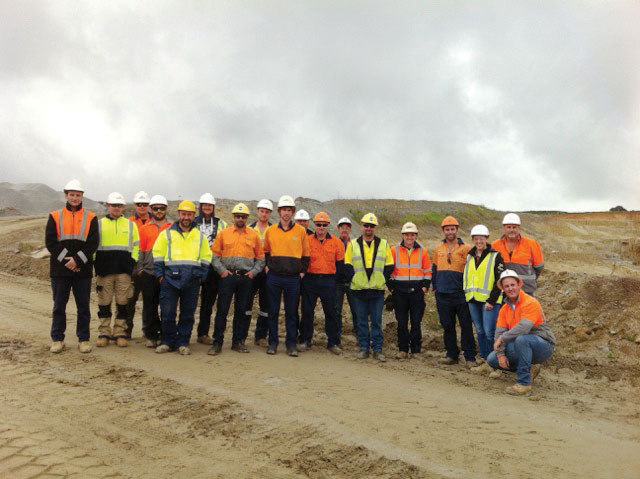A wealth of career potential in the quarrying and extractive industries.

NOEL PICKERING, Training Consultant in the Extractive Industries for Box Hill Institute reports on the courses on offer this year.
Box Hill Institute (BHI) has started 2016 well with a full suite of course offerings including Certificate III, Certificate IV, Diploma and Advanced Diploma.
Currently Certificate IV has a robust cohort of 18 students from a range of different sites and organisations which will mean a rich and varied learning environment for the students.
Site visits are again high on the agenda for the Certificate IV to give the students exposure to the cutting edge methods which the leaders in the industry use in getting the job done. The year kicks off with a visit to LafargeHolcim’s massive operations at Oaklands Junction. This quarry demonstrates the movement of a couple of million tonne of product out the front gate on an annual basis. Contractor management, blasting, sales and processing operations are the aspects which capture the attention of our students on our visits to Oaklands Junction.
Another site visit scheduled for later in the year is to the new pit at Fulton Hogan’s Tynong Quarry. It will be of interest to see how the operations are progressing. This quarry is always a favourite with the students as it affords the opportunity to see an amazing example of water management at its finest and it is a greenfields site in the making. The students are also able to observe first hand geological structures which put the need for stringent slope/pit wall stability into sharp focus.
Northern Quarry’s Epping Plant is another site visit critical to the learning of the students. When we want to clarify and demonstrate how to plan the design and construction of a plant correctly through consultation with the employees who will be operating and maintaining the plant – team work, inclusiveness and transparency of communication doesn’t get any better than what we find with this crew. There has not been one visit yet where the question “how do I apply for a job there?” has not been asked.
With yet another site visit, at Moriac we are able to observe side-by-side sand wash operations which demonstrate there are more ways to wash sand than just rinsing it. Local Mix Quarry and LafargeHolcim allow unfettered access to their operations which are “same same but kind of different”. The students soon understand how practices can change in this industry simply by crossing the road. The mode of operation shows when it comes to processing materials you need to understand your materials in the first instance and even then it takes a lot of trial and error to get it just right. Just when you think you have it sorted out the geology will throw you a curve ball just to keep you on your toes.
The Advanced Diploma is also utilising the benefits of site visits, enabling innovative and creative approaches to be encouraged from the students by interacting with subject matter first hand. The smaller size of the class could fool you into thinking this level of training is anything but powerful. It’s not a class for the faint hearted and the fact there are generally lower numbers than in the classes of Certificate IV and Diploma reflects the mental fortitude and initiative required to take this level of training on.
The dynamics of the class and the innovation which comes from its shared efforts is truly remarkable and is an inspiration to all. The depth of knowledge, creative thinking, camaraderie all melding together to turn current thinking on its head to come up with brilliant approaches to intricate problems facing sites on a daily basis. The Certificate IV, Diploma and Advanced Diploma will be using the CMPA’s new Working Safely with Geotechnical Risk in Quarries – Guideline, as an example of best practice and industry standard for students to benchmark their own sites practices. The delivery of the Box Hill Institute Units will relate to ensuring the stability of pit walls, benches and other structures within the quarrying environment. The same can be said of the way the training received in class aligns with existing Guidelines published by the CMPA giving best practice industry standards for performance in relation to guarding, blast management and
traffic management. These Guidelines are being used as best practice guidance in units covering Processing Operations, Blast Management and Mobile Plant Operations/Heavy-Light Vehicle interaction respectively.
Having the calibre of guest presenters like John Mitas to bring their government and industry expertise to our students will bring currency and high level expertise across the suite of programs. It will foster discussion and engage the students on subject matter like industry and community engagement, regulatory requirements and environmental challenges. This is an aspect of the curriculum BHI will be seeking to expand in 2016 and enable students to actually get to meet and hear from those behind the scenes who play such vital roles in their day to day quarry activities.
Shot firing renewals have been a topic of great concern resulting in vigorous debate and discussion of late. BHI is in the position to offer rigorous refresher programs over two days to ensure candidate compliance with current practices and requirements without removing them from their workplaces for extended periods of time.
Notifications regarding up-coming refresher courses will be published giving plenty of notice to schedule attendance. Expressions of interest will be received at any time.
BHI is striving to start the model Verification of Competency (VOC) training to be implemented in the coming months. The industry has shown a keen interest nationally in having VOC style training as an option for their experienced operators so as not to lose any more time from production than is absolutely necessary.
The model BHI is working on will follow an RPL model which will deliver exacting, practical assessments, reinforced by site management endorsement and the collation of site records showing the past operational history of the candidate. Questions and answers will demonstrate underpinning knowledge and the ability to deliver tailored gap training when the need arises. Candidates who are put forward for this style of assessment will normally have a minimum of 5 years experience on plant and equipment and would reasonably be assessed over a period of approximately 2 hours (dependant on candidate experience). All usual plant and equipment utilised in the quarry environment will be offered with the exception of items of plant and equipment which require WorkSafe High Risk Licences, such as forklifts, EWPs etc.
The Certificate III is rolling along as usual with quarries running the qualification for their employees on an as needs basis at their sites, enabling utilisation of plant and equipment as well as practical application of risk management processes etc. Expressions of interest are welcomed, as current clients have agreed to, and new candidates are more than welcome to join existing courses which are being run in their area. Experience has shown the more on the course, the better the learning and the understanding.
Not enrolled yet? What’s your excuse?
Enrolments are always open.
Get qualified, get informed, and get on it.
For further information contact: Diane Wilson 03 9286 9711.











You must be logged in to post a comment Login